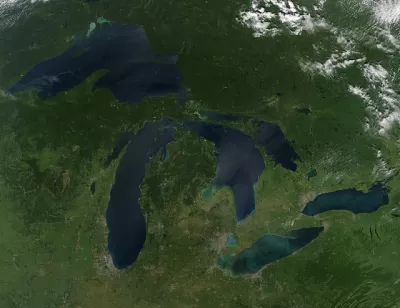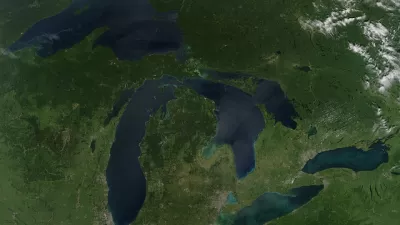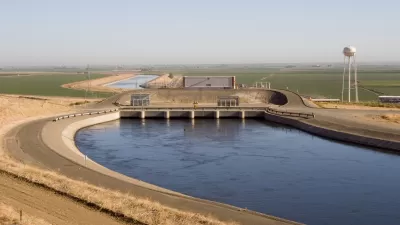The city of Waukesha asked for more water than the Great Lakes Compact would allow. Commenters remind the city of Waukesha that water for growth was never the goal of the Great Lakes Compact.

Don Behm of the Milwaukee-Wisconsin Journal Sentinel provides the big news about a decision by Great Lakes officials to cut a water diversion request intended to help the city of Waukesha, a suburb of Milwaukee, continue to grow. According to Behm, Waukesha's proposal requested an average of 10.1 million gallons a day. Great Lakes official trimmed that proposal to 8.2 million gallons a day by removing "portions of three neighboring communities from a future water service area to receive lake water," according to Behm.
An article by Angie Schmitt offers helpful perspective on the context and larger implications of the decision. "Governors of the states surrounding the Great Lakes are considering a water policy case with big implications for land development throughout the Midwest," writes Schmitt, who also provides this background:
Waukesha, Wisconsin, a sprawling suburban area outside Milwaukee, has exhausted its water resources. Rather than cooperate with the city of Milwaukee to secure water, Waukesha spent years preparing an application to divert water from Lake Michigan. Waukesha needs permission from the states and provinces that signed the Great Lakes Compact, a 2008 agreement to protect the world’s largest freshwater source from being pillaged.
In addition to providing that concise description of the issue, Schmitt's article shares the commentary provided by James Rowen of the Political Environment, who has been following the request since it was first proposed. According to Rowen, a recent decision by Great Lakes officials to cut the water diversion request should have been anticipated years ago.
Prior to the regional group's decision, the Wisconsin Department of Natural resources had approved the proposed change of service area.
FULL STORY: Great Lakes officials trim Waukesha's water request

Planetizen Federal Action Tracker
A weekly monitor of how Trump’s orders and actions are impacting planners and planning in America.

Maui's Vacation Rental Debate Turns Ugly
Verbal attacks, misinformation campaigns and fistfights plague a high-stakes debate to convert thousands of vacation rentals into long-term housing.

San Francisco Suspends Traffic Calming Amidst Record Deaths
Citing “a challenging fiscal landscape,” the city will cease the program on the heels of 42 traffic deaths, including 24 pedestrians.

Amtrak Rolls Out New Orleans to Alabama “Mardi Gras” Train
The new service will operate morning and evening departures between Mobile and New Orleans.

The Subversive Car-Free Guide to Trump's Great American Road Trip
Car-free ways to access Chicagoland’s best tourist attractions.

San Antonio and Austin are Fusing Into one Massive Megaregion
The region spanning the two central Texas cities is growing fast, posing challenges for local infrastructure and water supplies.
Urban Design for Planners 1: Software Tools
This six-course series explores essential urban design concepts using open source software and equips planners with the tools they need to participate fully in the urban design process.
Planning for Universal Design
Learn the tools for implementing Universal Design in planning regulations.
Heyer Gruel & Associates PA
JM Goldson LLC
Custer County Colorado
City of Camden Redevelopment Agency
City of Astoria
Transportation Research & Education Center (TREC) at Portland State University
Jefferson Parish Government
Camden Redevelopment Agency
City of Claremont




























